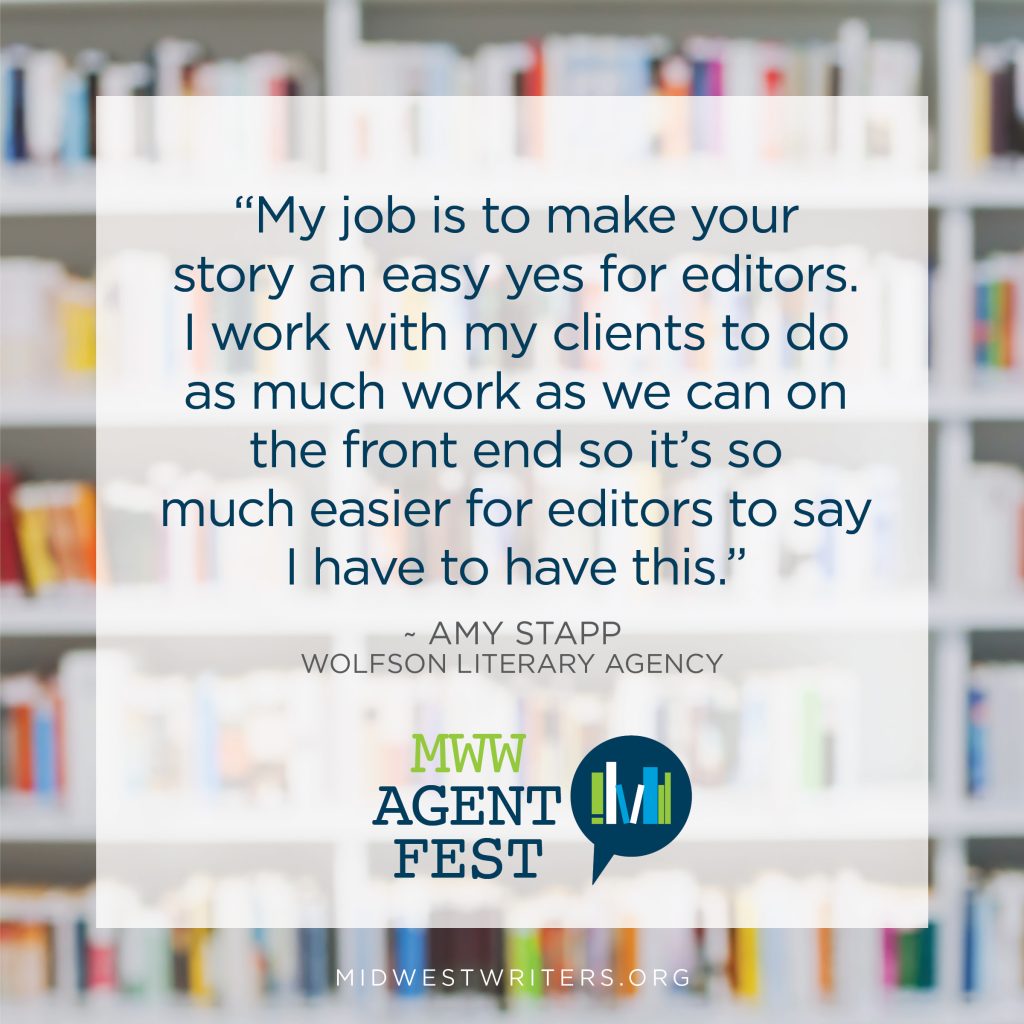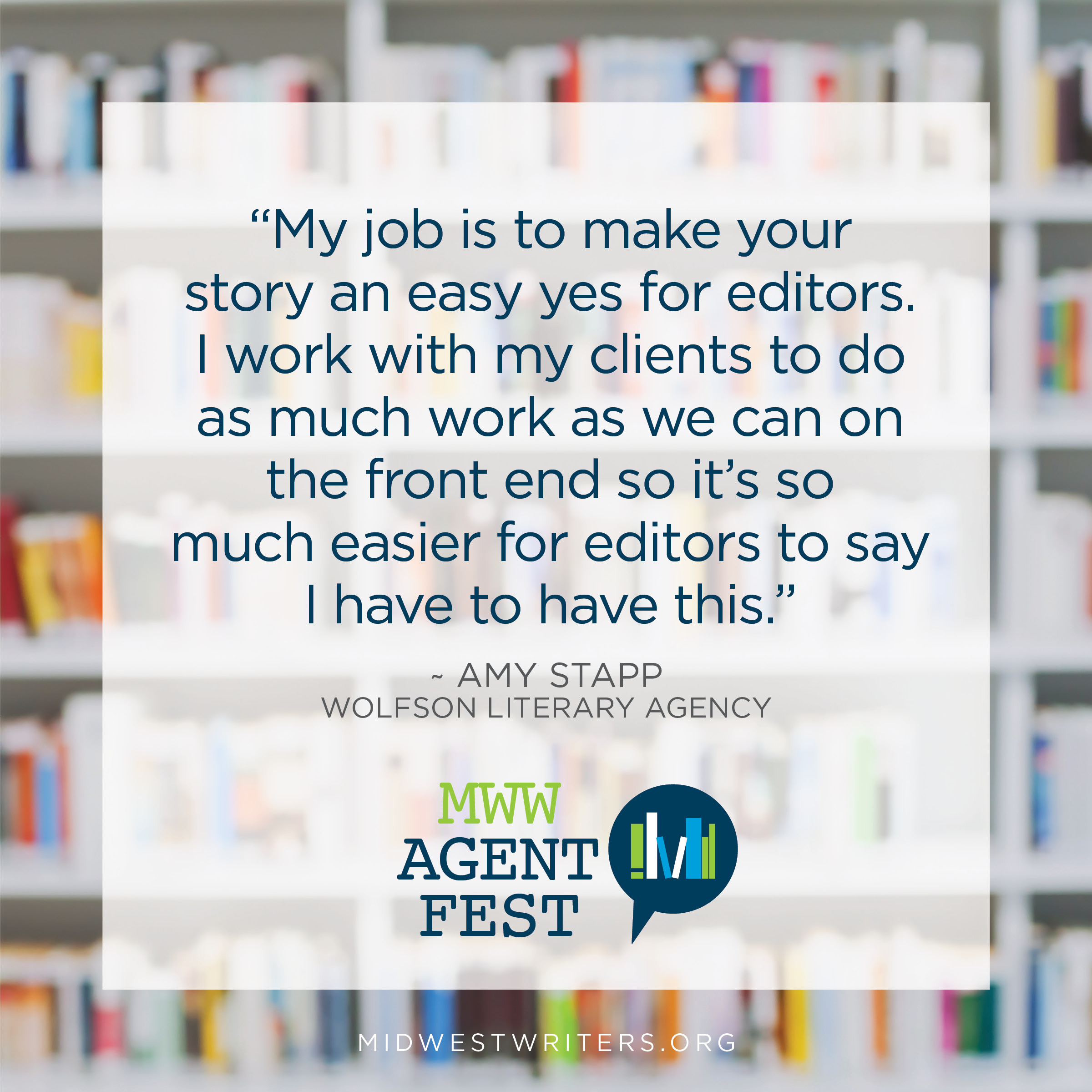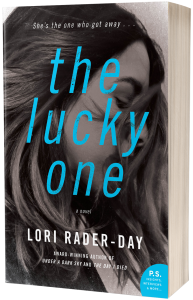Amy is one of eight literary agents participating in the MWW Agent Fest Online, November 18-21.
Amy Stapp received her BA from Samford University and MA from Georgia State University before beginning her publishing career at Macmillan, where she was an editor for seven years and had the privilege of working with numerous New York Times and USA Today bestselling authors. Amy joined Wolfson Literary in December 2018 and continues to actively build her list, with interest in women’s fiction, mystery, suspense, upmarket book club fiction, historical fiction, young adult, and select nonfiction. She is particularly drawn to a high concept hook, well-paced prose, immersive settings, and smart, multidimensional characters. As an editorial agent, she enjoys working hand-in-hand with authors to take their work to the next level. Find her online at wolfsonliterary.com.
Check out Amy’s Wish List!
- Fiction: twisty, intelligent suspense, upmarket book club fiction, women’s fiction that explores friendships and multigenerational ties, light magical realism
- Historical Fiction from a new perspective
- Young Adult Fiction: fast-paced, “unputdownable” story with a mature voice in a variety of genres—romance, mystery, historical, and unique coming-of-age stories
- Always looking for stories from underrepresented voices and in diverse settings
MWW agent assistant Kat Higgs-Coulthard interviewed Amy about how her experience as a former editor informs her process as an agent. Kat’s writing has appeared in Chicken Soup for the Soul, Jack & Jill, Cleaver, and Women on Writing. In her role as Director of Michiana Writers’ Center in South Bend, Indiana, Kat loves working with young writers through summer camps and writing conferences.
MWW: How does your experience as a former editor at Macmillan inform your work as an agent?
AS: That’s really what sets me apart from other agents. It is incredibly helpful for my clients to work with someone who is already familiar with what the next steps are in terms of the marketing, publicity, and what to expect from a publishing house.
I just have an editorial eye, so people who work with me tend to be people who are already very talented but want to take their work to the next level. I know exactly how hard it is to get something through an acquisition board. Being aware of that behind-the-scenes process allows me to set my authors up for long-term success.
MWW: You represent multiple genres. How do you feel about authors who write across genres or age categories, like for instance a YA novelist who also writes middle grade?
AS: It’s always good to diversify, but there are different schools of thought. Some people will tell you it’s difficult to build a following or to grow your readership if you are constantly jumping around, but that tends to be more once you already have a contract with a house. The publisher will have a specific strategy for trying to build your brand and grow your audience.
But it’s not at all uncommon for authors to write in multiple genres over the years. I will always tell a writer to write the story of your heart even if the story of your heart right now is some outlandish project that you know you can’t sell. Some writers call it your “through book.” You have to write your way through it before you can tackle the one that will become a bestseller. Try not to be so focused on writing something just because you think it will sell, when really you have a whole different project on your mind. When your heart isn’t in it, it shows in your writing. You have to write what’s on your heart.
MWW: What should writers do when their pitch results in a pass from the agent?
AS: I talk about this in Queries Do’s and Don’ts (Thurs., Nov. 19, 11am ET), so you should come to my session [laughs]. For a query rejection, the only thing you can do is keep writing the next book, keep perfecting your craft. For one-on-one pitches at conferences like this, I think one of my biggest pet peeves is when a writer will try to convince me why I’m wrong about their manuscript. That’s not a valuable use of either of our time. If I say this story isn’t the right fit for me, that doesn’t mean the conversation needs to end. How often are you sitting across from an agent? Make use of your time with me to ask me questions about publishing, to ask questions about your comps or how to improve your pitch, anything at all. I come to conferences to be helpful and useful to you in any way I can.
MWW: What should writers do when their pitch results in a request for pages?
AS: The number one mistake I see people make is submitting before they’re really ready. Hopefully you’ve already workshopped it with critique partners and through your writers’ circle. Just because someone at a conference says ‘this sounds like a great pitch, I’d love to see more,’ does not mean you have to send it tomorrow. It’s fine to take a few weeks, even a few months, so you can take the time to make your manuscript the best it can possibly be before sending it to an agent. There is no rush. Play the long game.
MWW: With all the reading you do for work, how do you find time to read for pleasure?
AS: I have a library app on my phone and I get audio books from the library. Any time I’m washing dishes, walking the dog, doing laundry, or whatever it is, I am constantly listening to the new bestseller to keep up-to-date on what’s popular in the genres I’m trying to sell at the moment. (And let me tell you, the best authors are doing that as well. If you’re not current on what’s selling in your genre, you’re probably not ready to start querying agents yet.) The book on my nightstand right now is And Now She’s Gone. It’s a thriller by Rachel Howzell Hall. She’s incredible; everyone should go buy her book. Next up on my TBR pile is Mexican Gothic by Silvia Moreno-Garcia. My tastes are pretty varied, from commercial bookclub favorites to upmarket women’s fiction, from lighthearted romcoms to dark and twisty thrillers, and everything in between.




